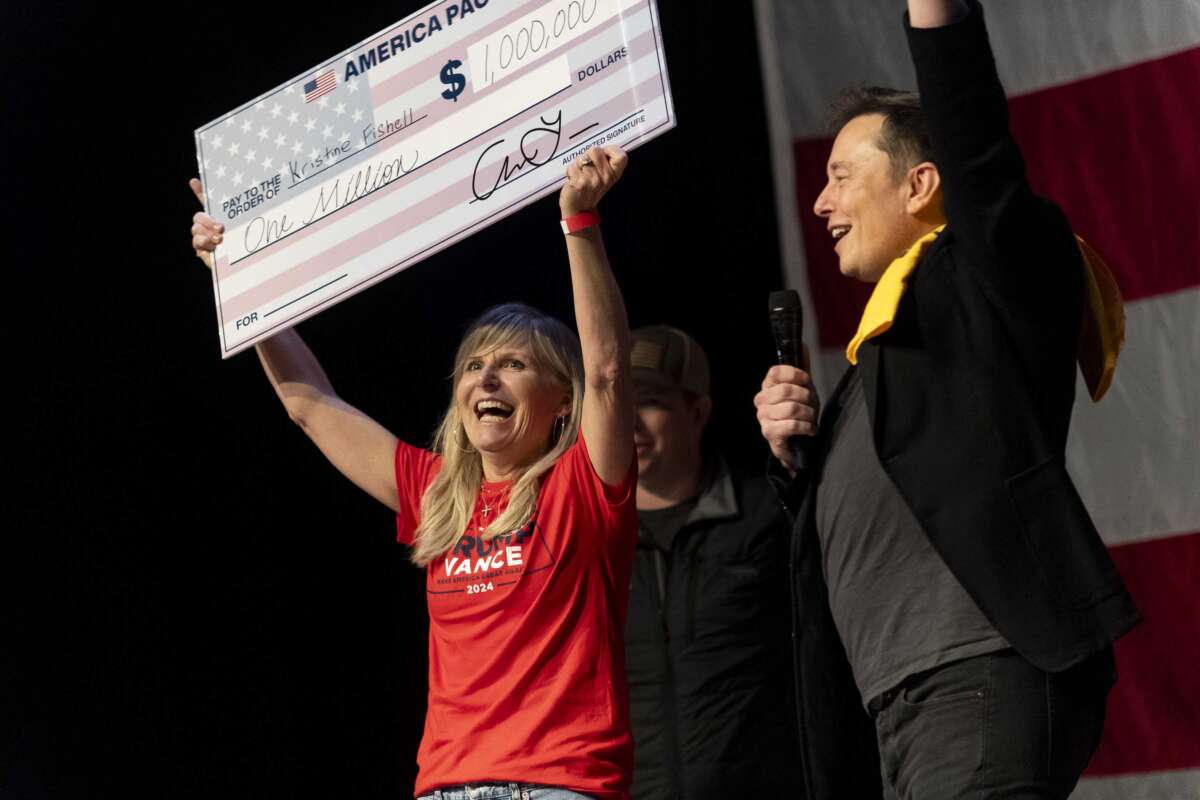Elon Musk and his political action committee are attempting to move a civil lawsuit — which alleges that Musk’s voter registration “lottery” scheme is unlawful — to federal court rather than the Pennsylvania state court system.
Musk’s legal team submitted the filing late Wednesday evening. He was scheduled to appear in Philadelphia County court on Thursday morning, after District Attorney Larry Krasner filed the lawsuit against the billionaire and his America PAC earlier this week. However, federal law requires state courts to delay any further action if a defendant submits a request to move proceedings from state to federal jurisdictions.
Musk asserts that the case is not about “state-law claims of nuisance and consumer protection,” but rather has to do with allegations of election “interference.”
“While [Krasner’s complaint] purports to raise only state-law claims relating to public nuisance and consumer protection, DA Krasner’s claims, as evident on the face of the Complaint, turn principally on the allegation that Defendants are somehow unlawfully interfering with a federal election,” Musk’s legal request maintains, suggesting that such questions of legality belong in a federal setting, not a state-based courtroom.
It’s unclear how quickly a federal court will react to Musk’s filing, and if an action in the case will happen before Election Day. Musk announced a new winner of his unregulated lottery scheme on Thursday morning.
Despite Musk’s legal objections to Krasner’s lawsuit, the district attorney’s complaint is fairly cut-and-dry about the fact that Musk’s lottery appears to be illegal.
Pennsylvania law requires every lottery administered in the state to be regulated by state officials. Musk’s lottery — which awards $1 million daily to a registered voter in a swing state, including Pennsylvania, who has signed a petition supporting the First and Second Amendments to the Constitution — is not regulated in any way.
“America PAC and Musk are lulling Philadelphia citizens — and others in the Commonwealth (and other swing states in the upcoming election) — to give up their personal identifying information and make a political pledge in exchange for the chance to win $1 million,” Krasner’s lawsuit stated. “That is a lottery. And it is indisputably an unlawful lottery. Under unambiguous Pennsylvania law, all lotteries in Pennsylvania must be regulated by the Commonwealth of Pennsylvania.”
The lawsuit also notes that state law defines illegal lotteries as public “nuisances” and that unregulated schemes like Musk’s are in violation of such laws.
The Department of Justice (DOJ) has recognized that Musk’s lottery scheme is likely in violation of federal law, as U.S. statutes forbid anyone from paying or offering to pay “either for registration to vote or for voting,” with steep penalties for individuals or entities that violate those terms. The DOJ, however, has declined to block Musk from continuing his lottery.
Election law experts have also said that Musk’s scheme is probably illegal.
“When you start limiting prizes or giveaways to only registered voters or only people who have voted, that’s where bribery concerns arise,” said Notre Dame Law School professor Derek Muller.
Our most important fundraising appeal of the year
December is the most critical time of year for Truthout, because our nonprofit news is funded almost entirely by individual donations from readers like you. So before you navigate away, we ask that you take just a second to support Truthout with a tax-deductible donation.
This year is a little different. We are up against a far-reaching, wide-scale attack on press freedom coming from the Trump administration. 2025 was a year of frightening censorship, news industry corporate consolidation, and worsening financial conditions for progressive nonprofits across the board.
We can only resist Trump’s agenda by cultivating a strong base of support. The right-wing mediasphere is funded comfortably by billionaire owners and venture capitalist philanthropists. At Truthout, we have you.
We’ve set an ambitious target for our year-end campaign — a goal of $250,000 to keep up our fight against authoritarianism in 2026. Please take a meaningful action in this fight: make a one-time or monthly donation to Truthout before December 31. If you have the means, please dig deep.
